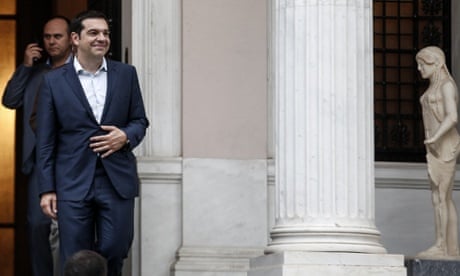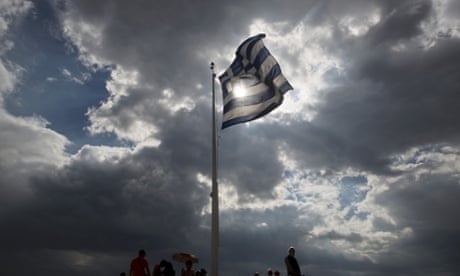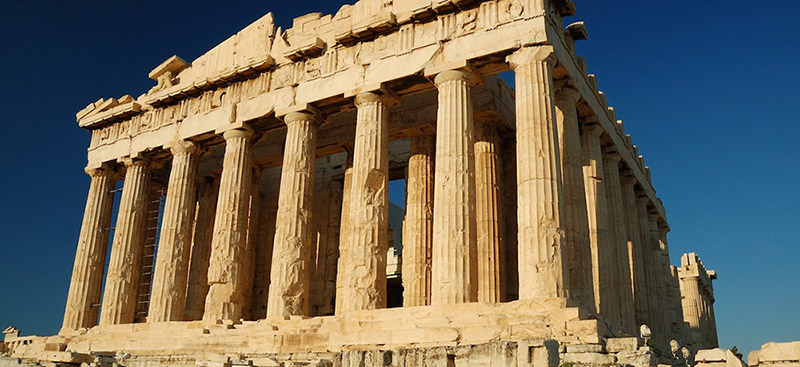-
Δημοσιεύσεις
771 -
Εγγραφή
-
Τελευταία επίσκεψη
-
Μέρες Νίκης
27
Δημοσιεύσεις Δημοσιεύθηκε από admin
-
-
We'll see. It's too early to say what's going to happen next. We'll know tomorrow or early next week what the real plan is moving forward.
I believe that they'll all meet at least one more time in the next week or two to find out if there's anything they can agree on and continue negotiations. If the Syriza government continues its unreasonable requests then we may see the EE pushing Greece out of the Euro. We'll see...
-
Have we to deal again? How so? It was already said that the referendum is irrelevant because we want a grexit. Do you honestly believe we give our money away fro free to a 3rd world country thats not even european? I must disappoint you. The table is broken and tiem for negotiations are over. We are a democracy too and people demand a referendum here as well to be asked IF we want help greece any longer. And the majority here says no. 86% of germans say greece should be kicked out of the EU. A greek referendum does not decide about other nations people.
Ah and just as i say it. Carsten Schneider, the head of the SPD fraction already said that the SPD (coalition partner of Merkels CDU) decided, that no talks and negotiations will be held with any Syriza regime. Its that easy. The greeks voted No and have to live with it. So will we.
Funny is that Varoufakis said today before the referendum that we will have a solution on monday, now after he got his result he said he never said this. It is funny how the communist regime even lies and changes comments at same day.

I'm pretty certain that they'll talk again with the Greek government and they will eventually provide financial support to keep Greece in the EU and the Euro. I guess the question is whether the terms in this new agreement are going to be favourable to Greece, as compared to what was put forward in earlier months. I'm assuming that the terms this time around may be harsher, but that's beyond the point. The point is that they'll have to sit at the same table with Tsipras and Varoufakis and hammer out an agreement.
-
The Greek people seem to have voted NO to the referendum question (I'd be surprised if NO doesn't get at least 60% by the time all results are in). I'd like to be a fly on the wall in the next Eurogroup meeting and see the faces of the Germans when they'll have to deal with Tsipras and Varoufakis again
 . Greek people have a twisted sense of humor
. Greek people have a twisted sense of humor 
-
Με εχεις μπερδεψει!

Τελικά υποστηριζεις τη Χρυση Αυγη ή άλλαξες γνωμη? Πιστευω να ξερεις οτι η Χρυση Αυγη στηριζει το οχι και την εξοδο απο την Ευρωπη και το Ευρω.
Εννοειται οτι το οχι θα ειναι καταστροφη για την Ελλαδα εφοσον ισχυουν οσα εχουν πει οι Ευρωπαιοι, οτι δηλαδη σε περιπτωση οχι δε θα κατσουν ξανα στο τραπεζι των διαπραγματευσεων. Οπως και να εχει, ειτε ναι βγει ειτε οχι η Ελλαδα απο αυριο θα βρεθει στη δυσκολοτερη θεση που εχει βρεθει ποτε στη συγχρονη ιστορια της. Ελπιζω μονο να μην εχουμε κι επεισοδια αυριο μεταξυ αυτων που θελουν να βγει το οχι με το ζορι κι οσων θελουν να ψηφισουν υπερ του να μεινουμε στην Ευρωπη και το Ευρω.
-
μουνοπανο doesn't translate as "mothefucker", google has it wrong
 It should translate as a "pussy rag" (the pad women use during their period).
It should translate as a "pussy rag" (the pad women use during their period). See, you learnt something new today

Nevertheless, eyoismos, please enough with the cursing. Patrick (or anyone else) can have their opinions however offensive may sound to you and I. Let's keep the discussion civilized.
Patrick, I'd also expect you to tone down your offensive against Greece too. This is a sensitive issues and a sensitive time for most Greeks. No need to add fuel to the fire.
-
Ποσα δισεκατομυρια ειπαμε οτι πρεπει να μαζευτουν?

-
Give me a reason why german tourists should travel to a country that is hostile toawards them?
Because unlike others most Greek people are always friendly and hospitable. Also, because Greece is the most beautiful summer vacation spot in Europe, bar none. Combine these two and you have the answer to your question.
Gazing out over Thessaloniki’s waterfront, Regina Jost, a social worker from Jever, in northern Germany, was on her last day of a week’s holiday discovering Greece’s picturesque northern beaches. “When I told my friends I was going to Greece on vacation, they said: ‘Oh be careful, something might happen, you’ll come up against bad feeling against Germans, people will hold it against you for being German,’” she said.
But despite the political tension between Athens and Berlin as Greece battles for economic survival, Jost said she had not experienced what some German media have described as “the fear of spit in the ouzo”. After six years of Greek caricatures of Angela Merkel in Nazi uniform, Greek demands for Nazi war reparations and the resentment at Berlin’s stance as unrelenting paymaster, only one person had been slightly frosty towards Jost – and that was a German whom she had asked for directions.
http://www.theguardian.com/world/2015/jun/21/german-tourists-greece-thessaloniki -
A taste of what lack of Good Faith means:
http://www.tovima.gr/society/article/?aid=718237
http://www.tovima.gr/society/article/?aid=718267
http://www.tovima.gr/finance/article/?aid=717954
http://www.tovima.gr/finance/article/?aid=718032
http://www.tovima.gr/finance/article/?aid=718352
http://www.tovima.gr/finance/article/?aid=718004
http://www.newsit.gr/ellada/capital-controls-epixeiriseis-kleistes-trapezes/414139
I quote a part of the last article
Συγκεκριμένα, ξενοδόχος στην Κρήτη ανέφερε ότι μέχρι χθες είχε ακυρώσεις που έφθασαν το 85%: «Έχουμε καταστραφεί. Τόσο καιρό μας παραμύθιαζαν ότι οι Θεσμοί πρότειναν επιβολή 23% ΦΠΑ, ενώ ο Πρόεδρος Γιούνκερ χθες αποκάλυψε ότι η πρόταση του ήταν μόλις 13%! Σκότωσαν τον τουρισμό μέσα σε λίγες ώρες και δουλειάς που είχαμε κάνει χρόνια. Μόνο χθες είχα ακυρώσεις των κρατήσεών μου κατά 40% και συνολικά έφτασαν το 85%».
Οι τουριστικοί παράγοντες βρίσκονται σε κατάσταση συναγερμού με το ΣΕΤΕ να ζητά ραντεβού με τον πρωθυπουργού, σε μια προσπάθεια να κάνουν έκκληση για κοινή λογική, καθώς το μοναδικό συγκριτικό πλεονέκτημα της χώρας μας τινάχτηκε στον αέρα στο όνομα τακτικισμών που μπορούν να οδηγήσουν την Ελλάδα στην απόλυτη απομόνωση.
Great job Alexi!
And this is just the beginning.
I have good friends who own small hotels or rental rooms in Santorini and Milos and they're both confirming that there are lots of cancellations for July. Considering that between July and until mid-August is their high/prime season seems that they'll be in very bad shape at the end of the year. The Syriza government did indeed hurt tourism with their moves, especially at a time when Greece could have scored big time with tourism after all the terrorism issues in North Africa.
-
That's right but try explaining that to a Syriza crowd.
Apparently it's not just the Syriza crowd. Your party is also supporting all this. They're part of the "oxi" movement

-
eyoismos, please keep the personal insults in check. No need for profanity. Everyone can have an opinion, however frustrating that opinion may be to you

-
I don't think Greece says "we're not paying". This whole situation is obviously much more complicated than what you describe in your example.
What we don't want to pay is the exorbitant fees added to the original loans.
In any case, obviously the Syriza government fucked up and made some enemies in the EU over these past few months. There's no denying that. If you're asking me I don't agree with the referendum too. What's the point for a referendum, especially when the question posed is completely irrelevant. If they really wanted to take direction from the people then the referendum should have taken place as soon as Syriza came to power and the question should have been "should Greece continue negotiations to stay in the EU and the Euro or not". As simple as that.
-
I thought you did not consider yourself Greek but Pontian. No need to worry about what us Greeks do then

It's going to be a rough week. Let's see what's going to happen on Monday morning. Seems that banks are set to be closed for a week until the referendum is completed.
-
I'd think the opposite. Tsipras has Europe in a stranglehold with his call for a referendum. I don't think anyone was expecting this move (I wasn't for sure).
This looks like a move a game theorist would do, so I suspect that Varoufakis' advice is behind all this.
We'll see whether this will work to Greece's benefit or if it will backfire. It goes without saying that Greeks in their vast majority will vote no to this referendum. What remains to be seen then is what the Tsipras government will do after the vote.
If the reject the measures suggested by EE and the money coming with it then how are they going to pay the creditors?
I hope that Varoufakis, the Greek government, IMF and EU officials realize that this is not a game. The're playing with people's lives here.
-
Well, being unemployed is not a choice in Greece. What do you suggest these people do?
-
The problem of the article is that it assumes that germany should do the same mistakes that the others do. Germany is extrempy productive and generates gargantuan profits. Other nations are unable to do so. It doesn also not state the simple fact that no other nation in europe produces anything of worth for the world. Germany does. Engineering and science.
We live in a globalized world. We must be competitive. We can´t win in the world with mediterranean laziness.
Have you thought for one minute who pockets those "gargantuan profits"? Is it the German people as a whole or a small (tiny) elite? Think about it and do some research.
The Greek elite live mighty fine too. In fact, they most likely do way better than they ever did these days. It's the average Greek who suffers. And don't think that the average German is in a much better position. It doesn't take much for an economy to go sour. Sure, Germany as a bigger and wealthier country will have more support mechanisms in place to withstand such as shock, but it's always going to be the average guy who will take the brunt of any economic downturn.
If you did indeed grow up in a lower middle class household, as I did, then you should be much more sympathetic to the suffering of the people.
-
Yes, I do spend some money on donations for suffering Greek children. That's beyond the point though. There's a need for a radical change in Greece. Throwing money to good causes is not nearly enough.
Many people hoped that Syriza would bring about this change but this doesn't seem to be the case.
Most of all Greek people will need to change themselves. Change some of their bad habits, acquired during the past 20-25 years of laziness, and go back to their old hard working ways. And don't get me wrong. There are many hard working Greeks today too. But there are way more lazy good for nothing assholes who need to change their ways. Unfortunately Syriza seems to be validating the behaviour of those assholes and punish the hard working people with more taxes. This is not going to help Greece one bit.
-
This is a very interesting article, definitely worth a read:
Nearly every discussion of the Greek fiasco is based on a morality play. Call it naughty Greece versus Noble Europe. Those troublesome Greeks never belonged in the euro, runs this story. Once inside, they got themselves into a big fat mess – and now it’s up to Europe to sort it all out.

Those are the basics all Wise Folk agree on. Then those on the right go on to say feckless must either accept Europe’s deal or get out of the single currency. Or if more liberal, they hem and haw, cough and splutter, before calling for Europe to show a little more charity to its southern basketcase. Whatever their solution, the Wise Folk agree on the problem: it’s not Brussels that’s at fault, it’s Athens. Oh, those turbulent Greeks! That’s the attitude you smell when the IMF's Christine Lagarde decries the Syriza government for not being "adult" enough. That’s what licenses the German press to portray Greece's finance minister, Yanis Varoufakis, as needing "psychiatric help".
There’s just one problem with this story: like most morality tales, it shatters upon contact with hard reality. Athens is merely the worst outbreak of a much bigger disease within the euro project. Because the single currency isn’t working for ordinary Europeans, from the Ruhr valley to Rome.
On saying this, I don’t close my eyes to the endemic corruption and tax-dodging in Greece (nor indeed, does the outsiders’ movement Syriza, which came to power campaigning against just these vices). Nor am I about to don Farage-ist chalkstripes. My charge is much simpler: the euro project is not only failing to deliver on the promises of its originators, it’s doing the exact opposite – by eroding the living standards of ordinary Europeans. And as we’ll see, that’s true even for those living in the continent’s number one economy, Germany.
First, let’s remind ourselves of the noble pledges made for the euro project. Let’s play the grainy footage of Germany’s Helmut Schmidt and France’s Giscard d’Estaing, as they lay the foundations for Europe’s grand unifier. Most of all, let’s remind ourselves of what the true believers felt. Take this from Oskar Lafontaine, Germany’s minister of finance, on the very eve of the launch of the euro. He talked of “the vision of a united Europe, to be reached through the gradual convergence of living standards, the deepening of democracy, and the flowering of a truly European culture”.
We could quote a thousand other such stanzas of euro-poetry, but that single line from Lafontaine shows how far the single-currency project has fallen. Instead of raising living standards across Europe, monetary union is pushing them downwards. Rather than deepening democracy, it is undermining it. As for “a truly European culture”, when German journalists accuse Greek ministers of “psychosis”, that mythic agora of nations is a long way off.
Of all these three charges, the first is most important – because it explains how the entire union is being undermined. To see what’s happened to the living standards of ordinary Europeans, turn to some extraordinary research published this year by Heiner Flassbeck, former chief economist at the United Nations Conference on Trade and Development, and Costas Lapavitsas, an economics professor at Soas University of London turned Syriza MP.
In Against the Troika, the German and the Greek publish one chart that explodes the idea that the euro has raised living standards. What they look at is unit labour costs – how much you need to pay staff to make one unit of output: a widget, say, or a bit of software. And they map labour costs across the eurozone from 1999 to 2013. What they find is that German workers have barely seen wages rise for the 14-year stretch. In the short life of the euro, working Germans have fared worse than the French, Austrians, Italians and many across southern Europe.
Yes, we’re talking about the same Germany: the mightiest economy on the continent, the one even David Cameron regards with envy. Yet the people working there and making the country more prosperous have seen barely any reward for their efforts. And this is the model for a continent.
Perhaps you have an image of Deutschland as being a nation of highly skilled, highly rewarded workers in gleaming factories. That workforce and its unions still exist – but it’s shrinking fast. What’s replacing it, according to Germany’s leading expert on inequality, Gerhard Bosch, are crap jobs. The low-wage workforce has shot up and is now almost at US levels, he reckons.Don’t blame this on the euro, but on the slow decline of German unions, and the trend of business towards outsourcing to cheaper eastern Europe. What the single currency has done is make Germany’s low-wage problems the ruin of an entire continent.
Workers in France, Italy, Spain and the rest of the eurozone are now being undercut by the epic wage freeze going on in the giant country in the middle. Flassbeck and Lapavitsas describe this as Germany’s “beggar thy neighbour” policy – “but only after beggaring its own people”.
In the last century, the other countries in the eurozone could have become more competitive by devaluing their national currencies – just as the UK has done since the banking meltdown. But now they’re all part of the same club, the only post-crash solution has been to pay workers less.

That is expressly what the European commission, the European Central Bank and the IMF are telling Greece: make workers redundant, pay those still in a job much less, and slash pensions for the elderly. But it’s not just in Greece. Nearly every meeting of the Wise Folk in Brussels and Strasbourg comes up with the same communique for “reform” of the labour market and social-security entitlements across the continent: a not-so-coded call for attacking ordinary people’s living standards. This is what the noble European project is turning into: a grim march to the bottom. This isn’t about creating a deeper democracy, but deeper markets – and the two are increasingly incompatible. Germany’s Angela Merkel has shown no compunction about meddling in the democratic affairs of other European countries – tacitly warning Greeks against voting for Syriza for instance, or forcing the Spanish socialist prime minister, José Luis Rodríguez Zapatero, to rip up the spending commitments that had won him an election.
The diplomatic beatings administered to Syriza since it came to power this year can only be seen as Europe trying to set an example to any Spanish voters who might be tempted to support its sister movement Podemos. Go too far left, runs the message, and you’ll get the same treatment.
Whatever the founding ideals of the eurozone, they don’t match up to the grim reality in 2015. This is Thatcher’s revolution, or Reagan’s – but now on a continental scale. And as then, it is accompanied by the idea that There Is No Alternative either to running an economy, or even to which kind of government voters get to choose.
The fact that this entire show is being brought in by agreeable-looking Wise Folk often claiming to be social democratic doesn’t render the project any nicer or gentler. It just lends the entire thing a nasty tang of hypocrisy.
http://www.theguardian.com/commentisfree/2015/jun/22/greece-eurozone-germans-single-currency
-
Seems that they're finally working towards a solution. Unfortunately this solution is not going to be easy to swallow for Greeks. The average middle-class Greek will carry again most of the weight...
-
Greece is a sovereign democratic country, much like Germany is. Nobody can take control of Greece or decide for her fate other than Greeks themselves.
If the Greeks (or the EU) decide that it's best for Greece to leave the Euro and the EU then so be it. There's not going to be any dissolution and no taking over by anyone.
-
 laughable...
laughable... -
Well, we'll see about that. There are a few more days left to strike a deal. Even though I also think that we're going for Grexit I can never be sure about what's discussed behind closed doors. Politics is a strange game, and many political decision made over the centuries are not based on common sense or our understanding of reality. Those people live in a different reality than the rest of us.
-
I think we're closer than ever to a Grexit at this point. Of course in politics you never say never, as things may change at the very last minute, and despite what many people think this is more of a political than a pure financial issue.
I guess there are a few questions that the EU will need to answer. For example, will a default necessarily push Greece out of the Euro? And if Greece does go out of the Euro will this in turn push her out the EU too?
http://www.bbc.com/news/world-europe-32332221
-
I wonder if the new Greek currency will end up looking like this if we exit the Euro


-
I think we're headed for a Grexit: http://www.wsj.com/articles/imf-greek-bailout-talks-stopped-amid-lack-of-progress-1434033497
It going to be interesting to see how the European and global markets are going to deal with this.
It's also going to be interesting to see how the EU is going to come out of this uscathed. Is Greece going to remain an EU member outside the Euro? Even though there are countries who are part of the EU and not part of the Euro it's unprecedented to have a country leave the Euro and remain in the EU. They'll have to figure out a mechanism to make this work if we're indeed headed for a Grexit, and they'll have to figure it out fast.




Is Greece close to Grexit?
in Γενική Συζήτηση
Δημοσιεύθηκε · Report reply
You know that the Germans are not the only ones to decide what's going to happen to Greece right? Nobody cares what your local politicians say about Greece. much like nobody cares about what Greek politicians say within Greece. This is all irrelevant.
The EU will have to make a decision shortly, and even though Germany's opinion does hold a lot of weight, it's the EU assembly that will decide on Greece's and EU's future.
We'll see what happens. This is not just a financial issue. It's a geopolitical issue.